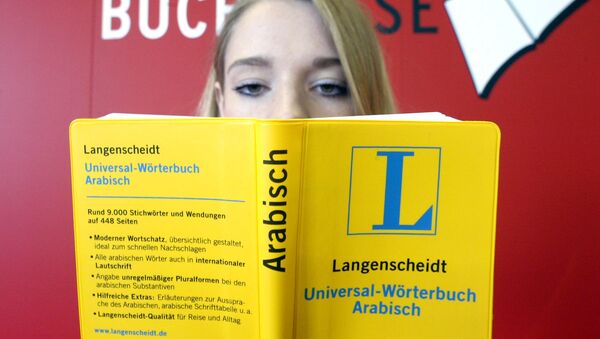Learning German is essential to finding work, and language instruction constitutes the basis of integration courses provided for refugees.
Germany's Federal Employment Agency has set an ambitious target: it hopes to see half of all refugees employed within five years. Within 15 years, it wants 70 percent of refugees to have found an occupation.
However, refugees' employment figures from last year underscore the scale of the task: between December 2015 and November 2016, just 34,000 asylum seekers from the eight most common countries of origin had found work.
At the same time, some government agencies have proposed extending services in Arabic so that refugees have better access to public services.
For example, earlier this month the Employment Agency in Halle began holding parents' evenings in schools in Arabic, to help parents with little knowledge of German to better understand their children's options for education or vocational training.
More than 300,000 asylum seekers in Germany are under the age of 18 and last year, Thomas Strothotte, a German-Canadian professor of Computer Science and President of Kühne Logistics University in Hamburg, suggested that not only should refugees learn German, but German children should have the opportunity to learn Arabic, too.
"As a Canadian citizen who has been living in Germany since 1985 and has played a major role in the establishment of two bilingual schools, I see this above all as an opportunity for a new model of school education," Strothotte wrote in the German newspaper Die Zeit.
He suggested that German and Arabic be mandatory subjects for children until their final high school exams prior to graduation.
"Thereby, we acknowledge that we are a country of immigration and a multilingual society," Strothotte said.
"Now there is a tendency towards Arabic becoming a compulsory language to learn in schools," Azzam said, adding that the Bundestag is likely to approve such a plan because "it is beneficial for the economics and politics of Germany."
German political scientist Naji Abbas told Sputnik that increasing numbers of Germans working in the civil service, particularly the Ministry of Foreign Affairs and other government organs, are enrolling on Arabic language courses.
"Germany wants to uphold its interests in the Middle East, and for that you need to know the language of the region. In the next ten years, the popularity of courses in this language is expected to increase. Moreover, the government plans to establish departments for Arabic teaching in its ministries, especially those which are establishing active ties with the Arab countries," Abbas explained.
Never miss a story again — sign up to our Telegram channel and we'll keep you up to speed!





